Table of Contents
Oh, the Things the Holidays Bring...
Many people love the holidays and Christmas season. This includes the disabled and those with chronic illness. All the warm, fuzzy feelings and gatherings with loved ones can bring real cheer. Yet many of us feel like we need to survive the holidays, too.
The holidays bring along with them: Increased physical activity, shopping for gifts, sparkly lights, Christmas carols on repeat, rich foods, sweet treats and more. I admit that I love all that, but it also means an increase in pain levels if left unmanaged. Many of us with chronic illnesses or disabilities would love to immerse ourselves in all that fun and festivities. But yet most of us struggle to even get through a single event.
The Season of Endless Triggers
Sensory overload and burning our limited energy supplies take a heavy toll on us spoonies. Bright, flashing lights can trigger migraines and epilepsy. Feasting on rich foods, even a bite of it, can prove nauseating or dangerous for many. Are we destined to have miserable holidays forever?!
Here’s a compilation of what hurts and helps the most over the holiday season. They’re opinions from 18 people with chronic illnesses and/or disabilities themselves. These tips can be particularly helpful this year, with the pandemic affecting everyone. Have a read and share your thoughts in the comments below, too!
Pin to Your Christmas, Holiday Season & Chronic Illness Boards:
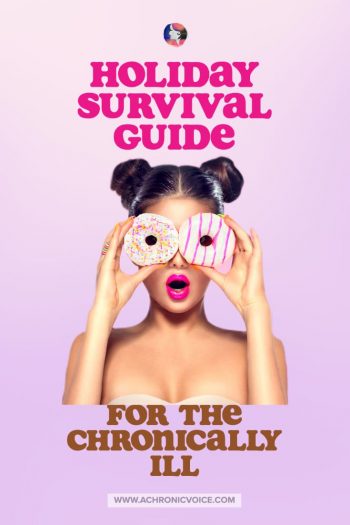
How Does Chronic Illness or Disability Affect You During the Holiday Season?
What is Your Best Tip to Survive the Holidays, Especially in Lockdown Mode?
Pippa Stacey
One of my biggest struggles during the festive season is finding seasonal food and treats suitable for my allergies. It takes a *lot* of planning and preparation to make sure I'm not left disappointed due to a lack of options during the festivities!
If you have specific dietary requirements, connect with others online and follow accounts dedicated to sharing safe foods. Save posts on Instagram or create lists of anything that catches your eye, and start as early as you can. If you do your research you can end up with a list of safe and suitable treats to add to your Christmas shopping!
Kat
I actively manage my workload before Christmas. That includes delegating, the to-do list AND the mental workload! Very important to let my husband do and plan certain things. For example, we buy pressies for half the family each, and that includes coming up with what to buy.
I also actively turn down invites to certain social arrangements. There is enough going on. And we don't need to meet up before Christmas, let's do it in January, when we're all bored anyway...
I am originally from Germany but live in the UK now. Due to flight prices and complicated travel arrangements, I have adapted over the years.
And for us, Christmas doesn't HAVE to be on a particular date. It's when we say it is. Drop the perfect and enjoy it for what it is. If you can't see your family on 25th Dec then plan in another date when everybody is able again.
Jenny
I have limited energy and I feel stressed easily. Food and drink also causes me to use the restroom frequently and experience bloating, pain, and nausea so I often don’t feel well.
Minimizing holiday plans to what’s manageable helps me feel better emotionally and physically. I host the holiday meal but I’m only responsible for cleaning while my parents cook the meal. This way no one has to do it all.
Cynthia Covert
Each year differs. What I can do and the modifications needed to get through is all dependent upon my current health status.
This year my health and pain is worse than last, so this year will be nothing like years past even if there wasn't a pandemic. I will have to make more modifications than I typically do, and really consider what I will really be able to do.
The best tip I could give is what I tell myself every year: Expect the unexpected and go with the flow. Not doing the same things every year can be a blessing in disguise, as it provides an opportunity to try something new.
Liz
My pain doesn't look at the calendar and say, ok, you'll need to be able to go shopping and prepare for Christmas, so I'll give you a reprieve for a week or so. It won't give even give me a reprieve on Christmas day.
Christmas normally means more shopping, more cooking, more socialising and more stress - all of which exacerbate my pain. It used to bother me more than it does now. It got me down that I really had to do things differently.
Now, I've learned to forget about shopping. If I buy gifts, I keep it simple and purchase online. On Christmas Day, my husband and I stay at home on our own. I'm happy with that. We chat to family on the phone or online. My husband helps with food and we plan and prepare what we can in advance, then have a lazy day. No stress, just a simple, enjoyable day.
Keep things simple and accept help. Also, accept that we can't change the current situation.
Alexandra
I tend to get less sleep because there are more outings or family/friends gathering at home later than usual. During this time, I tend to feel depletion instead of fulfillment because I’m constantly giving from an empty cup.
I tend to feel “not enough” for others because I’m not “giving” as much as I’d like to give: time and energy. But I try to practice communication skills to clarify my needs ahead as possible!
Meditation and recollection of the previous day helps me to recalibrate and push that reset button. Committing to a few of the several events rather than ALL gives me peace of mind.
Evaluating which gatherings you’re going to is a great way to sift through which ones would be meaningful AND flexible for your own illness/disability needs. But whichever you choose to go, you don’t have to stay for the whole time.
If the gathering is in your place, you can co-host with other family/friends. You can let your your co-host know your bedtime, so that when time approaches, they can start lowering down music, and other things to wind down the evening. You can go straight to bed, put on your earplugs and the co-host can run the rest of the gathering.
It’s so good to work as a team, so that you can avoid unnecessary triggers to flare ups!
Additional Tips:
Make decisions ahead of time. Be ready with a firm and confident response when family/friends question your decline of an invitation. And just honor your physical, emotional, mental needs (well, ALL of your needs). Fill your cup first before expending your time and energy. You’d have a much greater time with family/friends when you focus on managing and taking care of your needs.
Carrie Kellenberger
I typically find the last two months of every year hard to get through. It's like the marathon is almost over and the finish line is in sight, but trying to pace towards the end of it is difficult because of all the extra holiday activities that come up. Extra activity makes me worse, so we have learned to avoid a lot of those activities by saying no to most of them and choosing one that we really want to go to.
We have already locked our holiday activities down for the past five years so nothing will change for us. We'll celebrate like we usually do - in the comfort of our own home with some Skype calls with family and friends. Since Taiwan never entered lockdown, we can proceed with our annual Christmas meal at the W Hotel in Taipei.
seekingserenity and harmony
Holidays usually make it harder for me to emotionally regulate while dealing with Anxiety/Depression and S.A.D.. The cold air of winter also contributes by making my pain worse than in warmer months. I definitely need to make sure I am getting enough sleep and limiting my sugar and sweet holiday food intake.
Yes winter/holiday time limits my activities. That is often the time of year that my mental health is a bigger struggle and with the added stresses and business my inflammation and pain levels soar as well.
My tip is to listen to your body, be very aware of what it needs to keep things as balanced as possible. Try to be sure to take time for a nap or a good book. Whatever it is your mental and physical health needs to be a priority over all of the holiday chaos.
Jen Johansson
Because stress makes all my symptoms from Transverse Myelitis worse, I’ve had to let go of most of what I used to do during the Holiday Season.
But I’m a classically-trained singer who rarely gets to use her talents and my husband is the Director of Music at our church. And when he asks me to sing, I just can’t refuse him!
I pay for it dearly in pain, numbness, tingling, fatigue, and frustration, but being able to share my voice and serve my church is well worth the sacrifice!
Prioritize and simplify! Will this year be like it was pre-lockdown or would be without our illness or disabilities? No. But can it still be meaningful and memorable? Yes!
Let go of having to have magical or perfect holidays and focus on the things that really matter, whatever that may be to you and yours. It might not be easy and will probably be different but it can be good, even great, and you might even find a new tradition you wouldn’t have otherwise.
Christy
I have to remember not to overdo it. Christmas is my favorite holiday and I love spending extra time with the family. But overdoing it and not pacing myself will leave me hurting more.
This year isn’t any different from the rest since I was diagnosed with Rheumatoid Arthritis in 2016. I get my flu shot and had a mask to wear if I knew I was going to be around someone who could possibly be sick. I’ll even skip an event if needed. I had to skip Christmas with my extended family a few years ago because a family member had the flu the previous week. I didn’t have a mask and I wasn’t going to risk my health for festivities. If I was in control, I would have rescheduled when everyone was well.
Katie Clark
The fatigue hits after just getting into things. One of the traditions we have is baking my grandmother's Christmas cookies. She did about 20 different ones. While I never did that many, I tried to do 5-6 each season. I just can't stand all that time anymore.
So, I've given more and more of the baking to my daughter. When I do bake, I've found getting the ingredients prepared one day and making it the next, sometimes even baking the 3rd day, allows me not to over do. Oh, and my husband cleans up 😉
This will be an unusual season. But I'm so fortunate to have my daughter, son and daughter-in-law and my granddaughter in our bubble, so we'll mostly have a "normal " celebration.
We'll miss out on having a get-together with my sister's family (which we've done for 30 years) and our larger family party with my cousins and Aunt (who lost her husband this past August). I don't know if we'll try something virtual, but we will send out our Christmas letter.
Additional Tips:
I think it’s going to be tempting to let go of traditions and celebrations due to COVID-19 this year. But, I feel that it’s more important than ever to follow through, grounding us in something from “reality”.
Patti
Usually the stress of the season (not just the holidays but also my photography biz as it’s the busiest time then, too).
It gets to the point where I’m constantly exhausted and will fall asleep anywhere, especially on Thanksgiving or Christmas day.
I do all my shopping online and get them wrapped by wherever I bought it (usually Amazon).
My family is usually very good about having me bring easy things (like chips or sodas/drinks) for part of the meal, instead of cooking something, which is pretty hard for me to do.
Julie Holliday
I have to have a really strict diet because of gut issues related to chronic illness, but over the holidays I find it really difficult to not indulge, so I usually end up with worsening gut issues, and then a general worsening in my condition.
I also have to be really careful about the social events I get involved with, making sure they don't use too much energy. I can't party like I used to, but I've got used to that in general life, so it's not too much of a big deal at the holidays.
I always used to like to be the 'hostess with the mostest' though, and I still struggle a little to step back from that. The consequences of doing too much over the holidays though are pretty severe so I've learned to accept the way things have to be, by focusing on how I can realistically have the best time without putting my health at risk.
I think my biggest tip for the holidays is to focus on the joy that is available to you in any given moment, instead of what you might be missing out on.
Don't take any connection for granted, be present with loving moments. Be as grateful as possible with what is.
When I can't be present with the people I want to spend time with I hold them in mind while practising a loving kindness meditation. That way I feel like I can be involved with the spirit of the season.
Gabriela
I feel moderate headaches, lethargy, and off and on seizures.
I try to distract myself as much as possible. Reading, writing, singing, asking God for help, anything to take my mind off of what is consuming my thoughts.
Sam Moss
For those of us who love Christmas but live with chronic illness, we tend to approach the season with a little dread, mixed with joyful anticipation.
We simply can’t keep up with the expectations of others, or the expectations we used to put on ourselves in our healthier days.
Christmas with Chronic Illness and COVID, is a Christmas for two with my husband...simple, easy and no pressure.
Our pre lit tree will be the focus for Christmas and is much easier to enjoy decorating. I’ll be able to help adorn it with special ornaments we’ve purchased over the years. Our nativity scene will also be centre stage.
We are going to listen to carols and watch as many Christmas movies as we like. We will have a Christmas dinner but will eat it in the lounge room in comfort. We’ll keep it all very simple with easy to prepare festive food.
This year, when we celebrate Christmas chronic illness style, we are not alone. Times have changed for everyone.
The restrictions chronic illness sufferers have learned to embrace for years, due to their disabilities, are being forced on the healthy community, due to the impact COVID will have on Christmas.
Our family all live interstate, so even if they wanted to visit for Christmas, as they do every two years, it's impossible with border closures across our country.
Perhaps COVID is giving the world a Christmas gift. The gift of time. Time to stop. Time to get out of the rat race for a season. Time to reconnect with what really matters in life.
Jay
Flaring is more common between the extra activities and cold weather.
It's difficult to share the holiday tasks when you're limited to only your household, rather than having the help of your extended family. Pacing is key and be kind to yourself everything doesn't have to be perfect.
Alison Hayes
Late November is the anniversary of my father's death from a TBI, so I often struggle with depressive tendencies. Any form of emotional stress will trigger an increase in my FND symptoms.
So I need to be extra focused on striking a balance between having too much free time (and increasing my risk of depression), and overwhelming myself with the energy that comes with people celebrating the holidays.
Make sure to schedule 'recovery' time between events and to know what your next desired event is, so that you can focus on looking forward to that.
It's a delicate balance, but that anticipation aspect is extremely helpful for me in managing my mental health, even as I limit my activities to help with symptom management.
What Do You Do to Survive the Holidays Yourself?
-
Read Related Posts:
- Gifts I Love (But are Dangerous for Those with Chronic Illness & What to Give Instead)
- What Your Wish List Looks Like When You Live with Chronic Illnesses
- All I Want for Christmas is Some Pain Relief! (Real Wish List Ideas from 13 People with Chronic Illness)
- Sometimes, Physical Pain Isn’t the Worst Part About Chronic Illness
Pin to Your Chronic Illness & Holiday Boards:
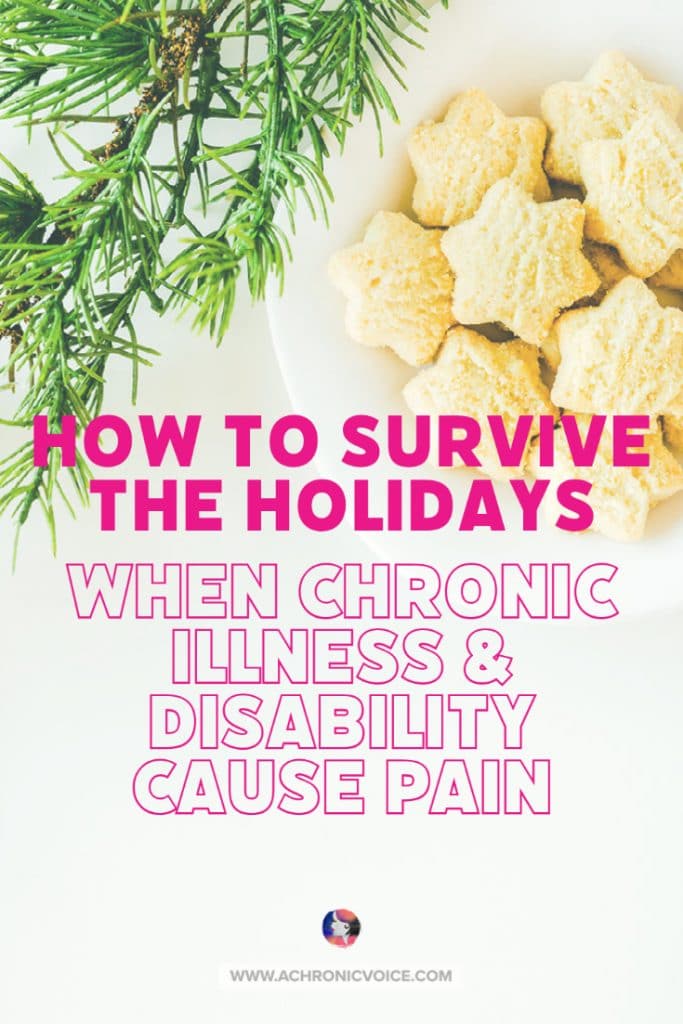
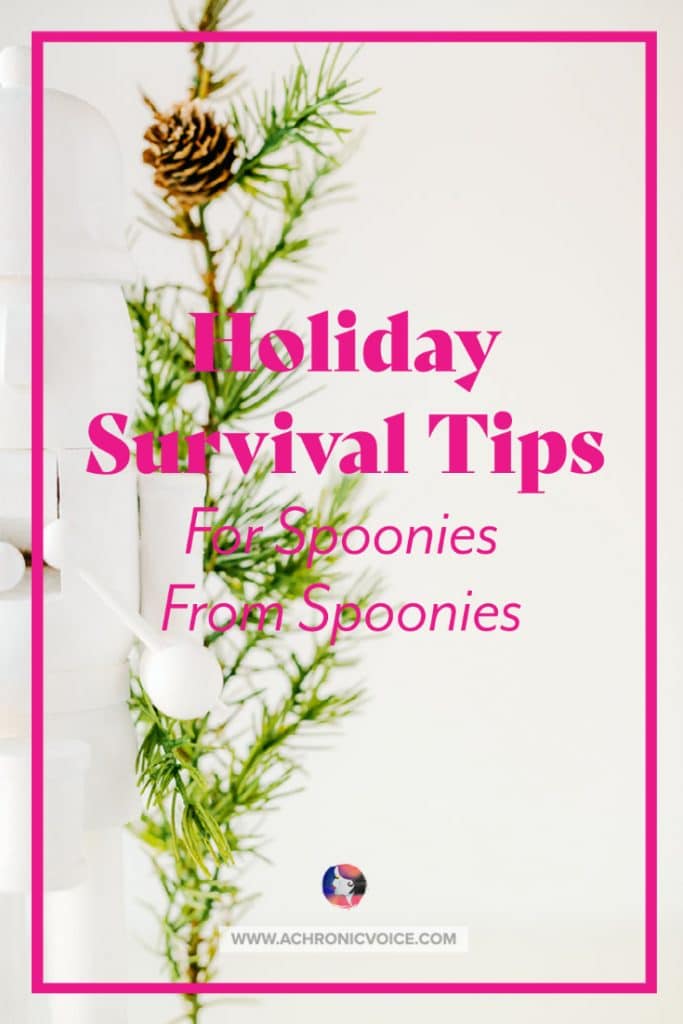
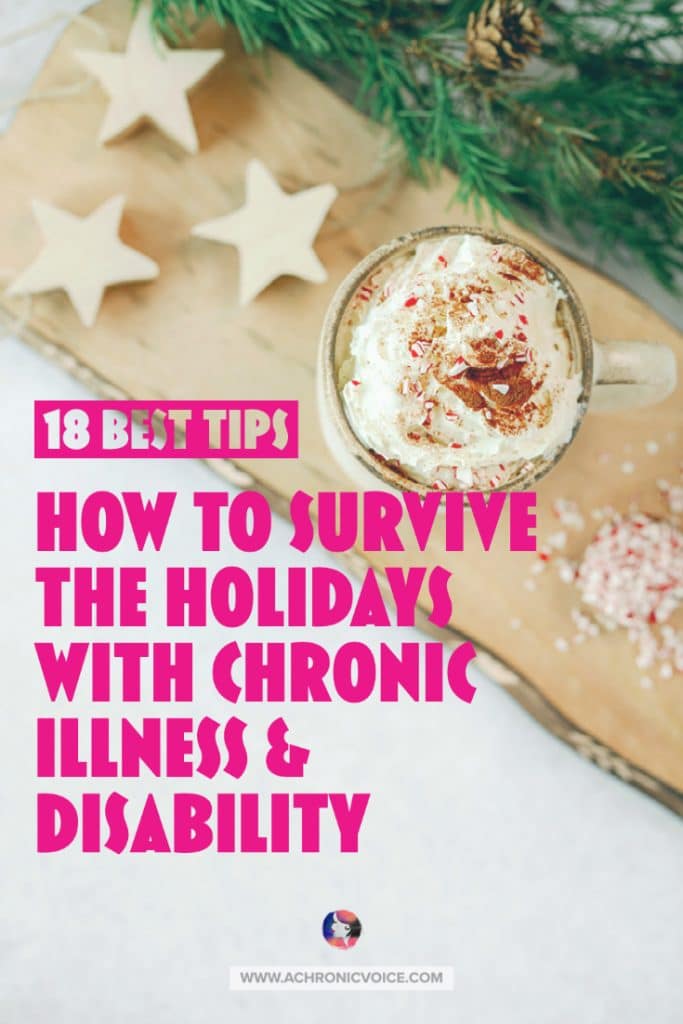
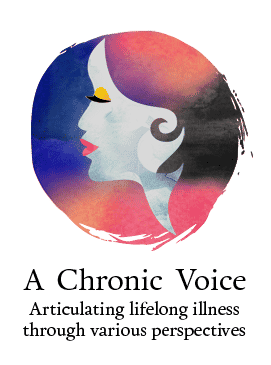
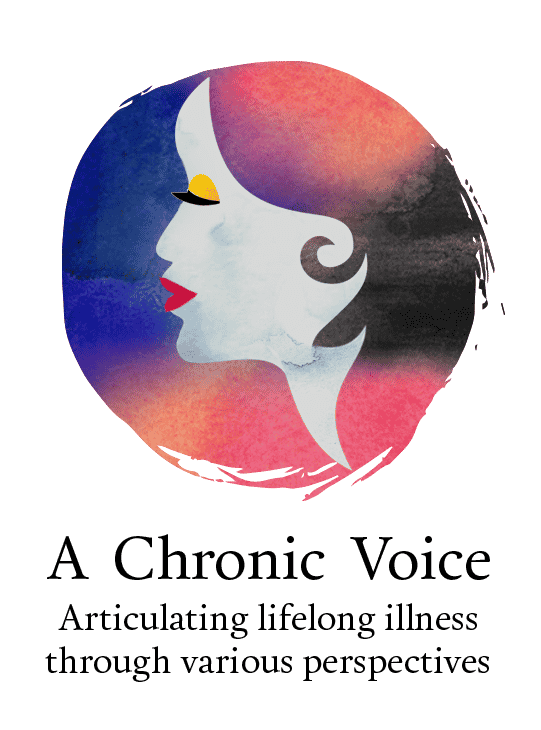
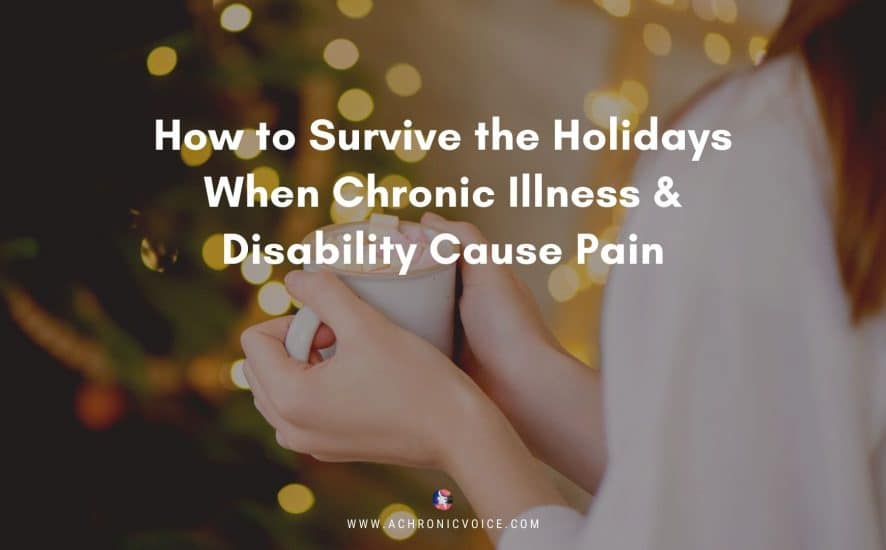
So agree with so many of these suggestions, particularly about having smaller celebrations if that’s what feels better for you. And screenshotting recipes for food intolerances – I do that so often!